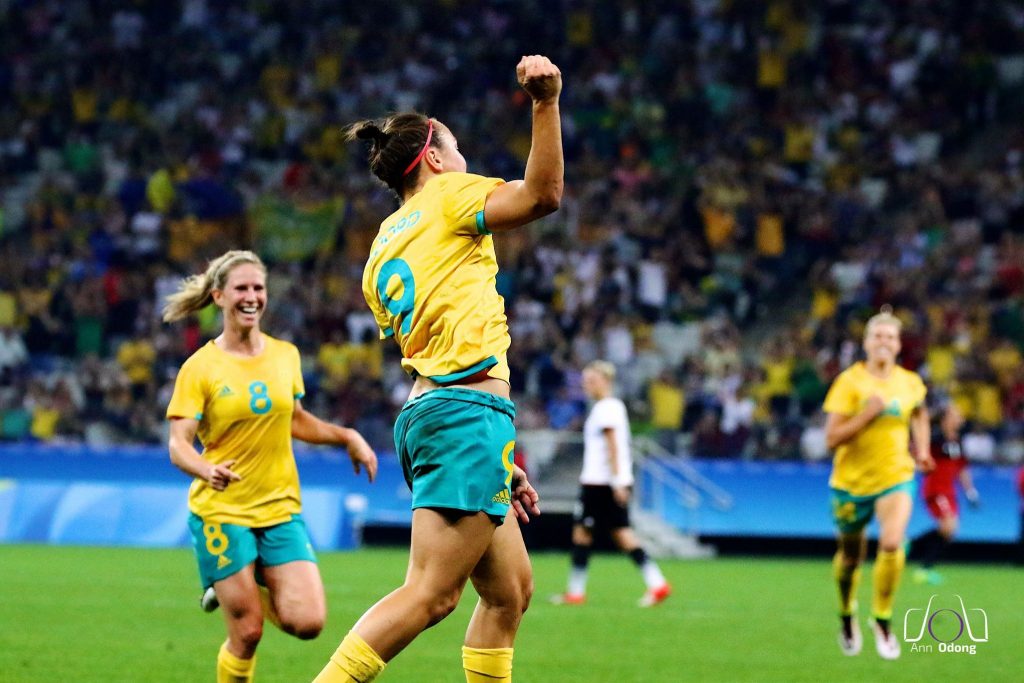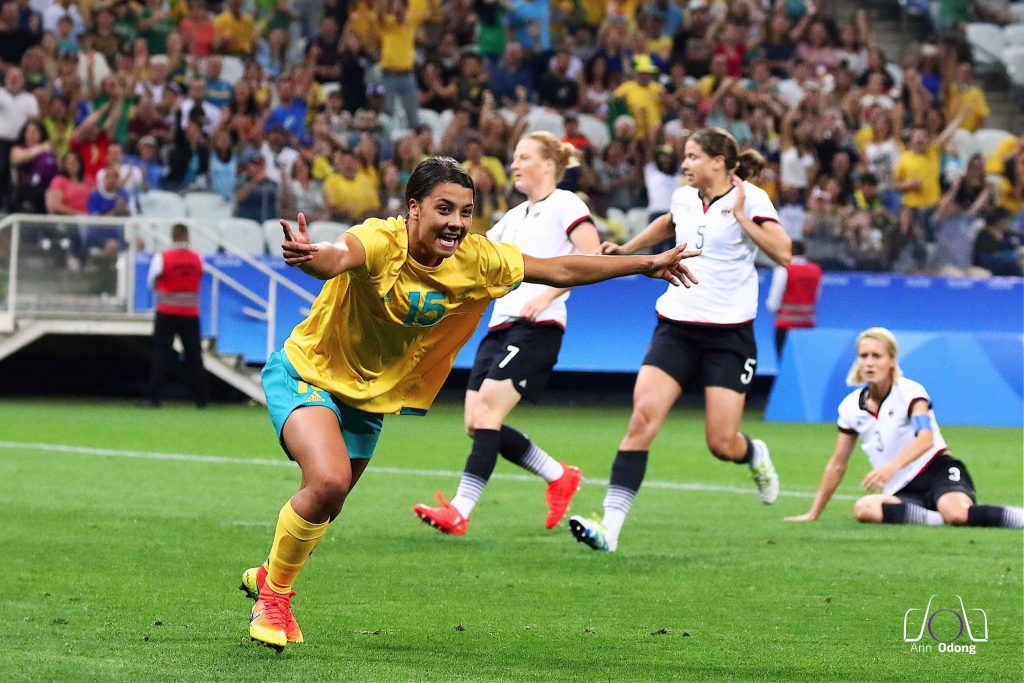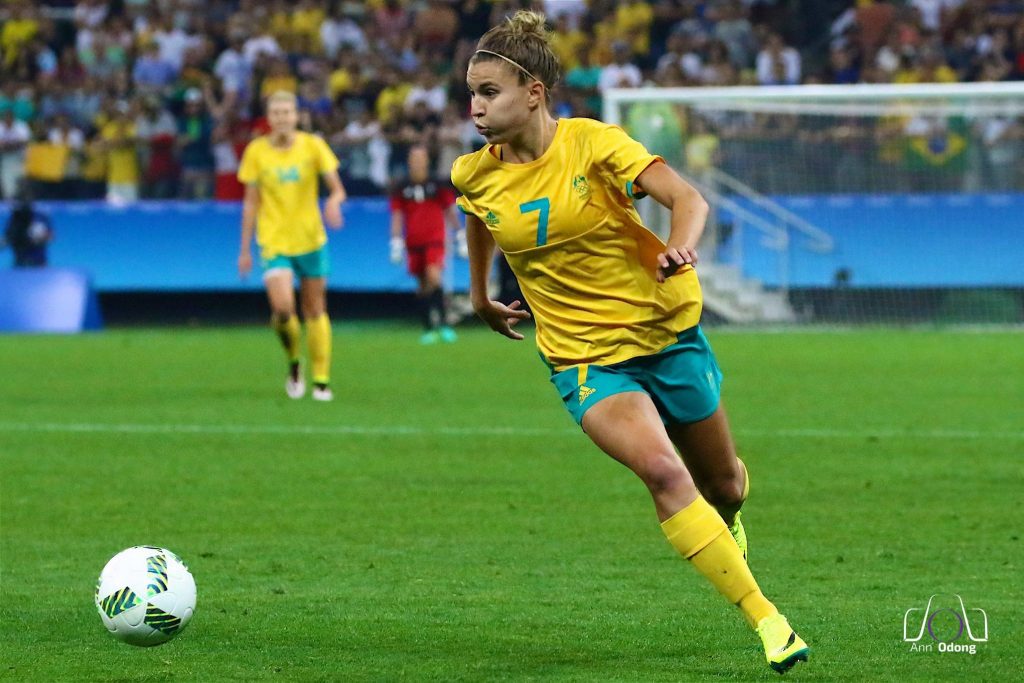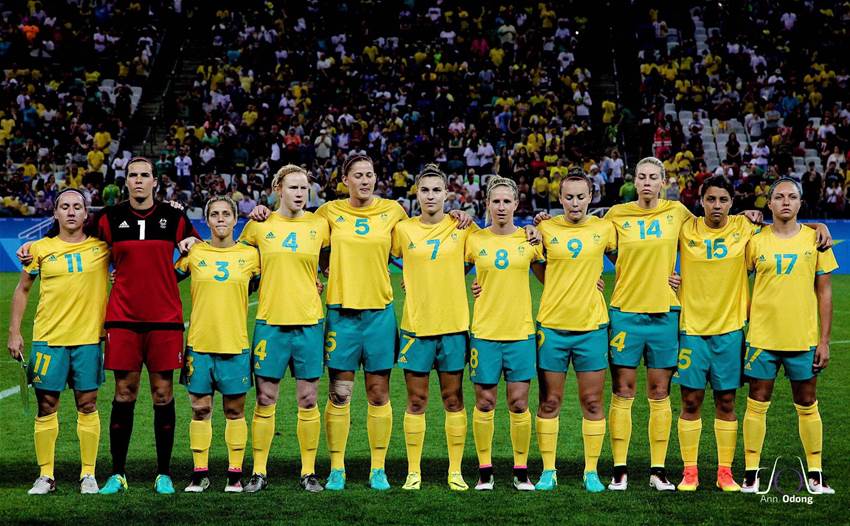Team Australia successfully revived their Olympic campaign proving they can mix it with the best, sharing the spoils 2-2 with women’s football powerhouse, Germany.
Team Australia successfully revived their Olympic campaign proving they can mix it with the best, sharing the spoils 2-2 with women’s football powerhouse, Germany.
Here’s what we learned:
- Style. Tasked with the monumental challenge of recovering both physically, and more importantly, mentally from a disappointing first outing, Team Australia entered game two with obvious focus.
Catalyst for what was a vastly improved second performance, the Australians made the most of their explosive pace and high pressing enthusiasm exposing vulnerability in an otherwise sound German side who would have been naïve to have expected any less from the spirited Australians.
The Green & Gold did well to assert themselves early, settling into a comfortable rhythm and relishing the opportunity to stretch the legs and get in behind the German defence. Despite the almost stereotypical ‘underdog’ title, the Australians made sure it was clear that there were two world class teams vying for the points.

- Combinations. Much has been written about Sam Kerr and Caitlin Foord in the lead up to the Games. If you were still wondering why Alen Stajcic took a gamble on a somewhat underprepared Kerr – you have your answer. If you didn’t quite understand the decision to develop Foord as an attacking player – you have your answer. The Kerr / Foord combination rocketed back into action when Foord made a dazzling run, shrugging off three defenders before playing a brilliantly isolating pass into the box for Kerr who coolly finished on her left with her first touch. The silky display set the precedent for the remainder of their exchanges, announcing them both as seriously exciting, dangerous attacking weapons.

- Closing. The Australian Women’s National Football team are often referred to as having endless potential. The potential to win tournaments, beat the best and ultimately be the best and, as it stands, they have been close – but close enough is just not good enough for a team with this much talent.
Fortunately for Germany, game two will go down as another ‘one that got away’ from Australia. In the post-match roundup multiple reports made reference to how Australia almost caused one of the great Olympic upsets – here’s my question; if Germany are ranked number 2 in the world and Australia number 5 (that’s 3 positions between them) how could that ever be considered an upset? The answer is simple; Australia will not be considered a champion team until they beat champion teams.
Similarly, Australia will not win the medals, the trophies, the rankings they so desperately deserve until they get the ‘coulda, shoulda, woulda’ monkey off their backs and start to close down games against big teams when they have the chance. The difference between close enough and good enough is taking chances, winning big moments and putting the foot on the throat when the opposition has their backs against the wall. If Australia can step up, anything is possible.
- Mentality. Here’s the thing about a champion side, it’s not over until it’s over. In an admirable display of mental toughness, Germany kept their composure long enough to stay with the pacey Australians and grind out an equaliser. Despite trailing for the vast majority of the match the Germans never looked out of the contest, firing long range efforts and slicing through the Australian defence with the kind of confidence that let you know the game would be pushed to the wire. Classy as always, the Germans should be pleased with their ability to keep calm and salvage a result even if they could only manage a point.
- Defence. In a dramatically improved opening exchange the Australian backline, bolstered by the return of Steph Catley, showed real resilience to leave the disappointment of game one behind them and move on with the kind of confidence required in big games situations.

Lydia Williams did her part contributing an out of skin first forty-five minutes to keep her team ahead but the mental edge was undone when Australia conceded minutes after having scored their second goal agonisingly close to half time. It goes without saying, conceding directly after scoring is a blight on an otherwise strong performance but in major tournaments you are often punished for switching off, even for just a second, a lesson Australia learned the hard way today.
Better but not their best, the Green & Gold need to stay sharp, take their time on the ball, complete passes and make smarter pressure decisions especially in possession in danger areas.
The good news? It’s onwards and upwards from here.
Related Articles

Matildas coach sought answers but has more questions

Kerr, fellow Matildas to be consulted in coach search
.jpeg&h=172&w=306&c=1&s=1)












